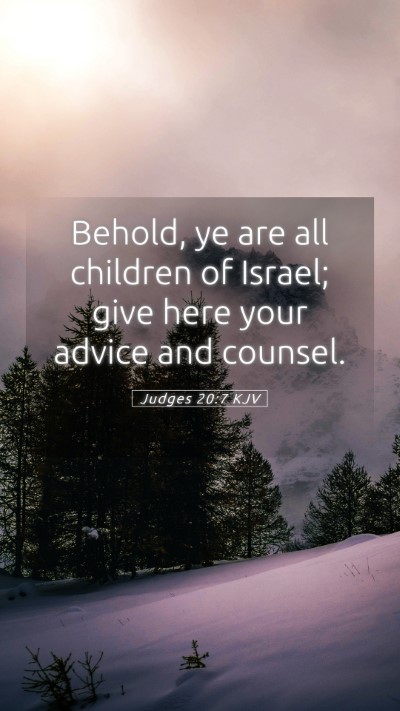Understanding Judges 20:7 - Commentary and Insights
Judges 20:7 presents a significant moment in the history of Israel, calling for reflection on both the immediate context and its wider implications. The verse reads: "Behold, ye are all the children of Israel; give here your advice and counsel." This cry from the assembly of Israel emphasizes the collective responsibility they hold and sets the stage for understanding the gravity of the situation they are in.
This commentary aims to provide Bible verse meanings, Bible verse interpretations, and Bible verse explanations, drawing insights from renowned public domain commentaries such as those by Matthew Henry, Albert Barnes, and Adam Clarke.
Context and Setting
In the context of Judges, the chapter illustrates a pivotal time in Israel's history, marked by strife and civil war. The events lead to a desperate call for unity among the tribes. This verse is pivotal because it highlights the collective nature of decision-making in Israel's covenant community.
Key Themes and Insights
- Collective Identity: The phrase "you are all the children of Israel" underscores the unity and collective identity that binds the people together. They are reminded of their shared heritage and responsibility towards one another.
- Call for Counsel: The request for advice and counsel demonstrates the importance of communal deliberation in times of crisis. It reflects a Biblical exegesis of leadership, where wisdom is sought from within the community rather than outside it.
- Consequences of Sin: The events leading up to this chapter are steeped in moral failure and injustice, specifically the senseless violence against a concubine that shook the nation. This serves as a reminder of the consequences of sin and the urgent need for reconciliation.
Commentary Highlights
Matthew Henry draws attention to the necessity of seeking divine guidance in decision-making, reminding readers that unity and shared purpose are critical when facing conflict. He emphasizes the accountability among the people of Israel and how it reflects a broader lesson for God's people today.
Albert Barnes remarks on the significance of this assembly and the importance of collective discourse. He notes that this moment serves as a precursor to a crucial battle and that their approach to conflict resolution can offer Bible study insights relevant to modern disputes.
Adam Clarke provides a historical perspective, linking the events of Judges 20 to the cyclical nature of Israel’s unfaithfulness and God’s call to repentance. His commentary encourages readers to consider how this narrative foreshadows both judgment and mercy in the broader Biblical narrative.
Related Bible Cross References
- Judges 19: The horrific events leading to the conflict.
- Psalm 133:1: The blessing of unity among brethren.
- Galatians 6:2: Bearing one another's burdens as a call to community support.
Application to Daily Life
Understanding this verse in the light of personal application can transform how individuals engage with their communities. Here are several ways to incorporate the insights from Judges 20:7 into daily life:
- Seek Counsel: Just as the Israelites sought collective advice, individuals should value the input of others in decision-making processes, especially in times of crisis.
- Embrace Community: Recognizing one's role in a larger community can foster support and unity, crucial for overcoming challenges.
- Reflect on Accountability: This scripture restores a sense of responsibility towards others, encouraging believers to act justly and righteously within their communities.
Conclusion
Judges 20:7 invites a deep exploration of the themes of unity, accountability, and collective counsel. It serves as a powerful reminder of the significance of community in the face of strife, the necessity of shared responsibility, and the importance of seeking divine guidance. By engaging with this verse and its commentary, individuals can gain a profound understanding of scripture that allows for richer discussions in Bible study groups, online Bible study sessions, and personal reflection.


